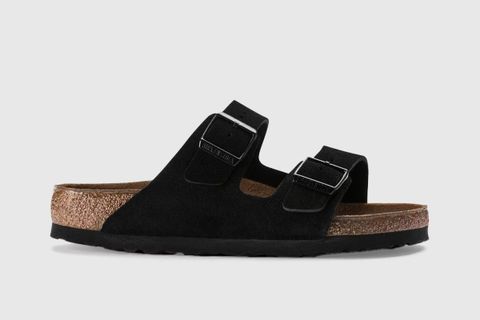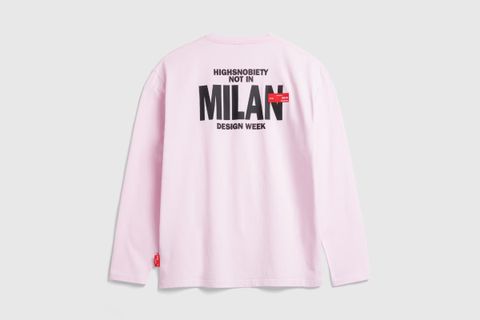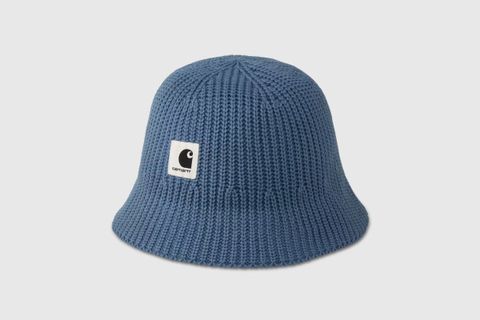Young Designers Are Promoting Climate Consciousness Beyond Earth Day
In today’s age of greenwashing,“Sustainability” is one of fashion’s favorite buzzwords. But there actually are brands combating some of the industry’s most urgent issues including fabric waste, carbon emissions, and overconsumption.
While larger conglomerates and fast fashion giants tend to enact performative policies for climate change, young indie designers are making pioneering moves towards actual eco-friendliness (or the closest possible thing).
The late Vivienne Westwood, while not new to the conversation, is the godmother of climate consciousness and deserves mention for blazing a trail that today's sustainably-minded designers still follow. Her early work defined youth’s culture in punk fashion and her environmental mission is an unspoken blueprint for today’s up-and-coming brands.
Westwood campaigned against overconsumption since the ‘70s, long before even the idea of “sustainability” was trendy.
Prior to most of the industry ever considering its impact on climate change, Westwood published a 12-page, zine-like Climate Manifesto in 2007 (the same year she vowed to halt using fur), which dove deep into the evils that capitalist consumption enacts upon Mother Earth.
As a pioneer to the cause, Westwood herself often led protests and campaigns against unethical business practices, such as her climate revolution gathering at the 2012 Paralympics and 2007’s “Cool Earth” campaign that fundraised to support deforestation and indigenous lands.
Westwood’s efforts earned her the Swarovski Award for Positive Change at the 2018 Fashion Awards. But her legacy doesn’t stop there, as her partner, Andreas Kronthaler, continues to use Westwood runway shows as a medium for continuous protest.
Bianca Saunders
Valuing innovation without skimping on quality, Saunders tackles the challenges facing this unsustainable industry in her own way. Saunders’ work references the three key pillars defined by the Institute of Positive Fashion : “environment, people, and community & craftsmanship.”
Her genderless, timeless clothes have earned countless accolades — from the British Fashion Awards’ 2023 New Establishment Menswear Designer to Forbes’ 30 under 30 list — but most of all, Saunders’ clothes emphasize fit and structure, going beyond trends.
Denim is an essential part of the brand identity, for instance, but Saunders doesn’t use any old cotton. She partnered with ISKO — the first global denim manufacturer to acquire EU Ecolabel and Nordic Swan certifications — for responsibly-sourced R-TWO denim (‘R’ standing for “reduced” and “recycled” fabrics) which was used to create the signature twisted seam jeans and bomber jackets.
Bite Studios
Bite, short for “By Independent Thinkers for Environmental Progress,” prides itself on prioritizing ethical production first, minimalist womenswear second.
The Swedish brand exclusively produces its clothes in Italy and Portugal, creating thoughtful staples that one could argue are the eco-friendly alternative to shapewear brands alike to Skims.
As part of its emphasis on fabrication, Bite’s products are created utilizing a guideline that ensures ethical manufacturing, based off of a material library utilizing organic silks, cottons, and viscose, an eco-conscious material made of dissolved tree pulp.
Brother Vellies
Brother Vellies' embrace of founder Aurora James’ South African heritage is evident in its historically-rooted designs, with shapes that reference the graphic language of the nearly-extinct Maasai tribe. Every pair of Brother Vellies shoes form part of what James envisions as a "forever wardrobe."
The label strays from traditional production practices and greenwashing tropes like vegan leather, which often amounts to nonrecyclable plastic with a detrimental carbon footprint.
The Brother Vellies product catalog instead includes an array of classic but progressive footwear, including pumps, loafers, sandals, and even the occasional sock to match. Each item narrates a story enriched by distinctive materials not limited to veg-tanned leathers, floral-dyed feathers, and intricately carved wooden soles.
James also founded the 15 Percent Pledge, an initiative advocating for retailers to allocate 15 percent of their shelf space to Black-owned businesses, demonstrating that her commitment to craft goes beyond surface level.
Collina Strada
Of course Collina Strada participated in the New York Botanical Garden’s flowers-as-fashion show: few other brands exemplify the harmonious coexistence of sustainability and self-expression as she.
With its playful approach to addressing otherwise disheartening environmental issues, the Brooklyn-based brand is transparent in its attempt to minimize, rather than entirely eliminate, its carbon footprint (an impossibility).
The main goals are represented by charitable partnerships and involvement with the OR Foundation, a self-described “Ghana and USA-based not-for-profit working at the intersection of environmental justice.”
Collina Strada also emphasizes the importance of fabric choices. It frequently incorporates thoughtful materials in particular Rose Sylk, sourced from rose bushes and stems, and repurposes deadstock fabrics, excess materials, and unwanted stock into new products.
Cordera
Cordera doesn’t merely claim pure production practices, it also has the luxe designs to back it up. Inspired by their home in Galicia, Spain, Cordera’s sibling founders, Monica and Maria, get their inspiration from their surroundings.
Ethical working practices are key to Cordera, which only develops limited edition garments often only available for pre order, with small factories to avoid overstock and overproduction.
Essential to each collection, quality textiles including recycled and cruelty-free knitwear yarn (no baby alpacas were harmed in the making of these garments) comprise the selection, with wool sweaters, shirts, dresses, and balaclavas just to name a few.
The garments ultimately speak for themselves. Where other brands tend to rely on flashy logos, Cordera prides themselves on their signature Guatemalan embroidery symbolized through flowers, beaded patterns, and ethnic characters.
Duran Lantink
Duran Lantink’s designs are both artistic and ethical. Primarily known for creating bulbous shapes out of upcycled fabrics, the LVMH Prize-nominated Dutch designer is a favorite of celebs like Beyoncé, Doja Cat, and Billie Eilish.
Lantink strikes ecological conversations on the runway, too: the looks in his Spring/Summer 2024 runway were produced of 95% recycled materials.
He even once transformed the ultimate symbol of consumerism into clothing for Fall/Winter 2024 when he made an outfit out of discarded McDonald’s wrappers.
Manu Atelier
It’s rare to find 100% handcrafted luxury bags — even the largest luxury labels typically only utilize the occasional bit of hand stitching —, but Manu Atelier proves to be the exception. This attitude is even stated in its name: “’manu” means “hand” in Latin.
While prioritizing craftsmanship — everything the cutting of leather patterns to the stitching of the bags themselves is done by hand — Manu’s artisans also practice a zero-waste policy and a vertical production process from start to finish that’s certified by SEDEX, the Supplier Ethical Data Exchange.
Despite the unique fabrication, Manu’s signature styles — which include the “Three Striped Baguette” and Ilda shoulder bag — are informed by classic shapes. It’s just that the leather comprising them happens to be responsibly sourced from the non-profit Leather Working Group.
Peterson Stoop
It takes years to imbue your favorite sneakers with memories but Peterson Stoop’s mission is to give each pair of shoes a pre-existing “soul.” No need to toss old kicks when you can give them new life instead.
Founded as a self-described “global footwear redesigner” (a step above your average cobbler), Peterson Stoop’s practice is founded upon the ‘Circle Welt,’ a 100-step process that turns your aged Off-White™ Air Jordan 1s into a totally new shoe.
The process involves hands-on deconstruction and reconstruction of the original sneakers, from disassembly to the creation of a new heel to a new welt that secures old shoe to new sole.
And, if you have no worn-down sneakers desperate for new life, Peterson Stoop also produces its own footwear, made entirely of recycled post-consumer footwear.


